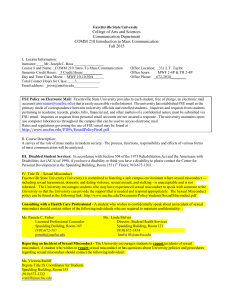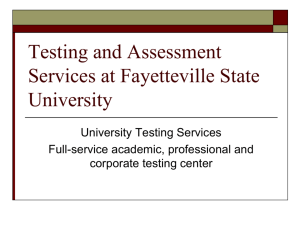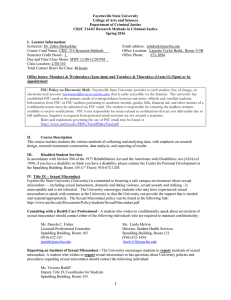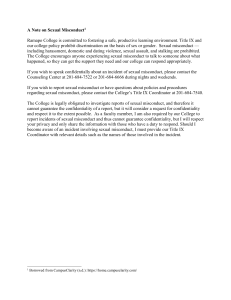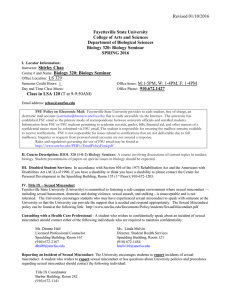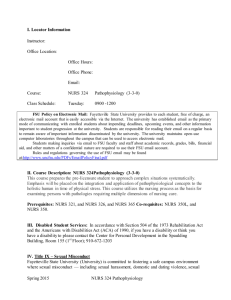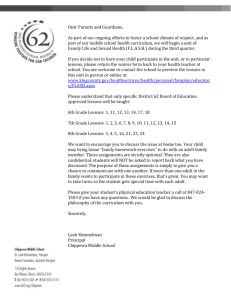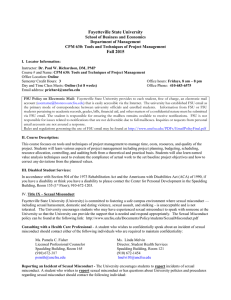MGMT 610-01 - MBA Program - Fayetteville State University
advertisement
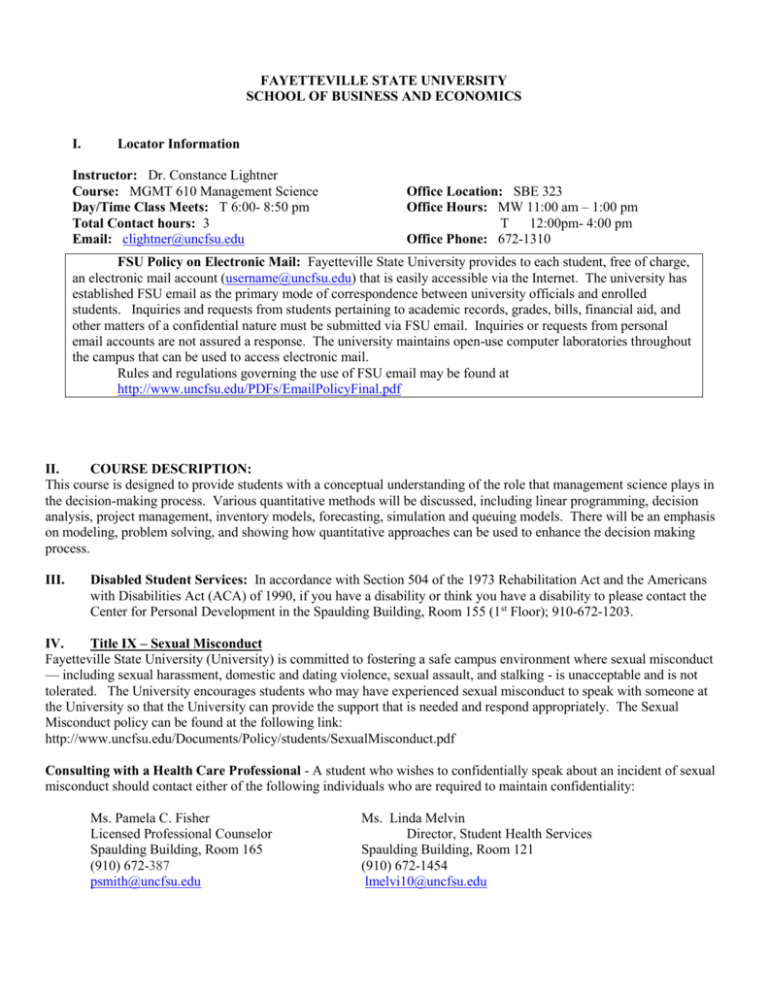
FAYETTEVILLE STATE UNIVERSITY SCHOOL OF BUSINESS AND ECONOMICS I. Locator Information Instructor: Dr. Constance Lightner Course: MGMT 610 Management Science Day/Time Class Meets: T 6:00- 8:50 pm Total Contact hours: 3 Email: clightner@uncfsu.edu Office Location: SBE 323 Office Hours: MW 11:00 am – 1:00 pm T 12:00pm- 4:00 pm Office Phone: 672-1310 FSU Policy on Electronic Mail: Fayetteville State University provides to each student, free of charge, an electronic mail account (username@uncfsu.edu) that is easily accessible via the Internet. The university has established FSU email as the primary mode of correspondence between university officials and enrolled students. Inquiries and requests from students pertaining to academic records, grades, bills, financial aid, and other matters of a confidential nature must be submitted via FSU email. Inquiries or requests from personal email accounts are not assured a response. The university maintains open-use computer laboratories throughout the campus that can be used to access electronic mail. Rules and regulations governing the use of FSU email may be found at http://www.uncfsu.edu/PDFs/EmailPolicyFinal.pdf II. COURSE DESCRIPTION: This course is designed to provide students with a conceptual understanding of the role that management science plays in the decision-making process. Various quantitative methods will be discussed, including linear programming, decision analysis, project management, inventory models, forecasting, simulation and queuing models. There will be an emphasis on modeling, problem solving, and showing how quantitative approaches can be used to enhance the decision making process. III. Disabled Student Services: In accordance with Section 504 of the 1973 Rehabilitation Act and the Americans with Disabilities Act (ACA) of 1990, if you have a disability or think you have a disability to please contact the Center for Personal Development in the Spaulding Building, Room 155 (1st Floor); 910-672-1203. IV. Title IX – Sexual Misconduct Fayetteville State University (University) is committed to fostering a safe campus environment where sexual misconduct — including sexual harassment, domestic and dating violence, sexual assault, and stalking - is unacceptable and is not tolerated. The University encourages students who may have experienced sexual misconduct to speak with someone at the University so that the University can provide the support that is needed and respond appropriately. The Sexual Misconduct policy can be found at the following link: http://www.uncfsu.edu/Documents/Policy/students/SexualMisconduct.pdf Consulting with a Health Care Professional - A student who wishes to confidentially speak about an incident of sexual misconduct should contact either of the following individuals who are required to maintain confidentiality: Ms. Pamela C. Fisher Licensed Professional Counselor Spaulding Building, Room 165 (910) 672-387 psmith@uncfsu.edu Ms. Linda Melvin Director, Student Health Services Spaulding Building, Room 121 (910) 672-1454 lmelvi10@uncfsu.edu Reporting an Incident of Sexual Misconduct - The University encourages students to report incidents of sexual misconduct. A student who wishes to report sexual misconduct or has questions about University policies and procedures regarding sexual misconduct should contact the following individual: Ms. Victoria Ratliff Deputy Title IX Coordinator for Students Spaulding Building, Room 155 (910) 672-1222 vratliff@uncfsu.edu Unlike the Licensed Professional Counselor or the Director of Student Health Services, the Deputy Title IX Coordinator is legally obligated to investigate reports of sexual misconduct, and therefore cannot guarantee confidentiality, but a request for confidentiality will be considered and respected to the extent possible. Students are also encouraged to report incidents of sexual misconduct to the University’s Police and Public Safety Department at (910) 672-1911. V. COURSE TEXT: Anderson, Sweeney, and Williams, Intro to Management Science, 13th ed (9781439043271) VI. STUDENT LEARNING OUTCOMES Upon completion of this class, the student will be able to: 1. Define and use Management Science terminology. 2. Formulate basic models for problem solving techniques. 3. Use quantitative methods to solve typical decision making problems that arise in business. 4. Recognize applications of Management Science concepts and techniques. VII. COURSE REQUIREMENTS AND EVALUATION CRITERIA: A. GRADING SCALE: A= 90-100 B=80- Below 90 C=70- Below 80 F=Below 70 b. ATTENDANCE REQUIREMENTS: You are expected to attend all classes. In the event of an absence, you are responsible for all material discussed in class. c. GRADING CRITERIA : Examinations (3) Exam 1 Exam 2 Exam 3 Projects/Assignments 70% 25% 20% 25% 30% d. Homework Assignment Due Dates/Times: Late homework assignments will not be accepted. e. Policy on Missed or Late Assignments: 1. Late homework assignments will not be accepted. f. OTHER CLASS POLICIES: Examinations This course includes 3 exams. MAKEUP EXAMS WILL NOT BE GIVEN. It is your responsibility to ensure that you are present on all exam days. Cell Phones Cell phones may not be used or displayed at any time during quizzes or tests. Violations in this policy will result in a 0 grade for the assessment. VIII. ACADEMIC RESOURCES: See our course Blackboard site under Additional Resources. This site provides links to the university’s Math Support center, ITTS, on campus computer labs, and additional university resources that may assist you in this course IX. Date COURSE OUTLINE Chapter Title January 13 20-27 February 3 10-17 24 Introduction to MS Excel Tutorial Introduction to LP Chapter No. 2 LP Problem Formulation **See Chapter 7 for more examples 2,4 Solving LPs Project 1 Assigned 2 Linear Programming: Sensitivity Analysis and Interpretation of Solution 3 *******EXAM I******* Project 1 Due March 3 March 3 Forecasting Project 2 Assigned 10 SPRING BREAK************************************* 17 Forecasting Continued Project Management 10 24 Project Management 10 31 *******EXAM II****** Project 2 Due April 7 April 7-28 Simulation 16 Project 3 Assigned ---- Project 3 Due 5/5 May 5 *******EXAM III****** INFORMATION OUTLINED IN THIS SYLLABUS IS SUBJECT TO CHANGE. X. TEACHING STRATEGIES: This is a web enhanced course that involves lectures (classroom and virtual), individual and group computer and Internet assignments, and midterm and final exams. Most computer exercises will be completed using Microsoft Excel software packages. All course assignments, homework solutions, notes, programs, and other course documentation will be provided via the Internet. In addition, regular web discussion boards and virtual classroom meetings will be scheduled as needed to enhance student learning. XI. REFERENCES Anderson, Sweeney, and Williams, Intro to Management Science, 13th ed (9781439043271) F. Hillier, M. Hillier, and G. Lieberman, “Introduction to Management Science.” Boston, MA: Irwin/McGraw-Hill. J. Lawrence and B. Pasternack, “Applied Management Science.” New York, NY: John Wiley and Sons. J. Moore and L. Weatherhead, “Decision Modeling with Microsoft Excel.” Upper Saddle River, New Jersey: Prentice Hall. B. Render, and R. Stair, “Quantitative Analysis for Management, Upper Saddle, NJ: Prentice Hall. W. Winston and S. Albright, “Practical Management Science, ” Pacific Grove, California: Duxbury/Thompson Learning.
